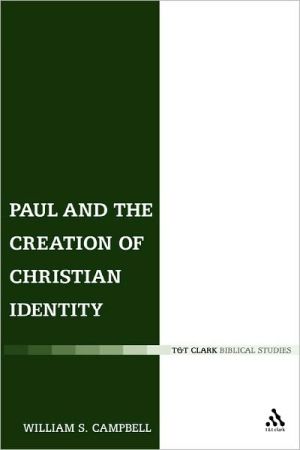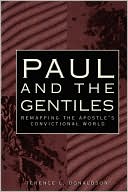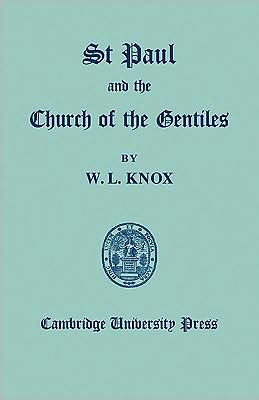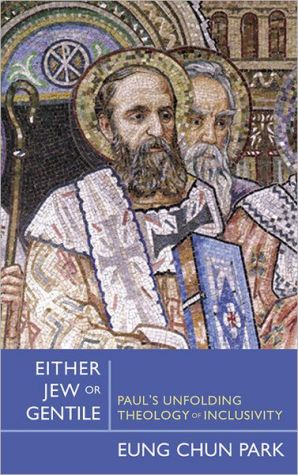Paul and the Creation of Christian Identity
In the dominant interpretation of the Antioch incident Paul is viewed as separating from Peter and Jewish Christianity to lead his own independent mission which was eventually to triumph in the creation of a church with a gentile identity. Paul's gentile mission, however, represented only one strand of the Christ movement but has been universalized to signify the whole. The consequence of this view of Paul is that the earliest diversity in which he operated and which he affirmed has been...
Search in google:
Paul is traditionally viewed as separating from early Jewish followers of Christ and from the church of Peter to promote his own mission, eventually triumphing in the creation of a church with a gentile identity. William S. Campbell argues that Paul's gentile mission was not a reaction to his Jewish heritage, but a transformation based on his vision of Christ: thus the identity of Christianity cannot be that of a new religion.About the Author:William S. Campbell is Reader in Biblical Studies at the University of Wales, Lampeter, UK
Preface xiAbbreviations xiiiIntroduction 1Jewish Identity in the First Century CE 2Ethnic Issues in the Pauline Letters 6Paul and the Politics of Difference 9The Approach of this Study 10Terminology 12Plan of the Book 13Pauline Interpretation and Christian Identity: Aspects of the History of Research 15F.C. Baur and His Legacy 15The Recovery of Paul in His Jewish Context 17Paul Among Jews and Gentiles 21Ernst Kasemann and the Righteousness of God in Paul 23Sanders' and Dunn's New Perspective 26Opposition to the New Perspective 29Conclusion 31Paul's Theologizing Concerning the Other 33Paul, the Recipient and Sole Interpreter of a Divine Revelation? 33Solidarity and Mutuality within the Communities 35Paul's Relationship with other Leaders and their Missions 38The Antioch Incident: The Catalyst of the Perception of Incompatibility Between Faith in Christ and Life as a Jew? 42A Non-Sectarian Reading of Paul 46Conclusion 50Paul's Peculiar Problem: The Creation of Gentile Identity in Christ 54Paul, the Innovator 54The Scriptures of Israel and the Formation of Gentile Identity in Christ 57Abraham, the Father of Us All, the Locus of Shared Identity in Christ 61In What Sense Were the Pauline Communities Distinct? 64The Tripartite Context: Paul's Mission Between State and Synagogue 68'Christians', Jews and Civic Authorities in Interaction 69Paul's Goal for His Communities in the Promotion of Solidarity in Christ 72Paul's Interaction with the Situation at Rome 75The Function of the Pauline Legacy in the Formation of 'Christian' Identity in Antioch 79The Significance of the Tripartite Context for the Formation of 'Christian' Identity 83Conclusion 84I Laid the Foundation: Paul the Architect of Christian Identity? 86Paul's Own Self-Understanding and Identity 87The Relativization of All Things in Christ 89Ethnicity and Paul's Construction of Identity in Christ 93Paul's Foundational Design: Potential Models 96Conclusion 101Paul's Attitude Towards Jewish Identity in Romans 104The Identity of Paul's Addressees in Romans 104The Identity of the Jew in Romans 2 107Judaism and Jewish Identity in Romans: Negative Aspects 109Judaizers in Romans? 111Judaism and Jewish Identity in Romans: Positive Aspects 113The Affirmation of Jewish Identity in Romans 14-15 114Conclusion 119Self-Understanding and the People of God: Israel in Romans 121Jews, Gentiles and Israel: The Implications of Paul's Terminology 121The Remnant in Paul: A Saving Remnant and a Sign of Hope 127The Church is not Israel (or New Israel) 129Paul's Eschatology is Based on Confirmation of the Promises, not Fulfilment 133God's Covenant is Irrevocable: The Identity of Israel is not Transferable 134Christ-Defined Identity 140Christ-Defined Identity and Continuity with the Narrative of Israel 140Christ-Followers as New Creation 141Divergent Interpretations of Divine Action in History 143Individualism and Faith in Christ 147Continuity and Discontinuity in Personal Identity in Christ 149A Christ-Defined Identity and Antagonism to Judaism 151Corporate Identity in Christ 153The Identity of Jesus as Messiah of Israel 155Multiple Identities in Christ? 156Conclusion: Paul's Theology as a Theology of Transformation 159Theology or Theologizing? 159The Catalyst: Social Factors in the Concrete Context of Paul's Communities 161The Basis: Belonging to Christ 163The Process: the Interaction Between Relativization and Transformation 165Transformation in Paul: an Ongoing Process 171Epilogue 174Bibliography 176Index of References 197Index of Authors 201








